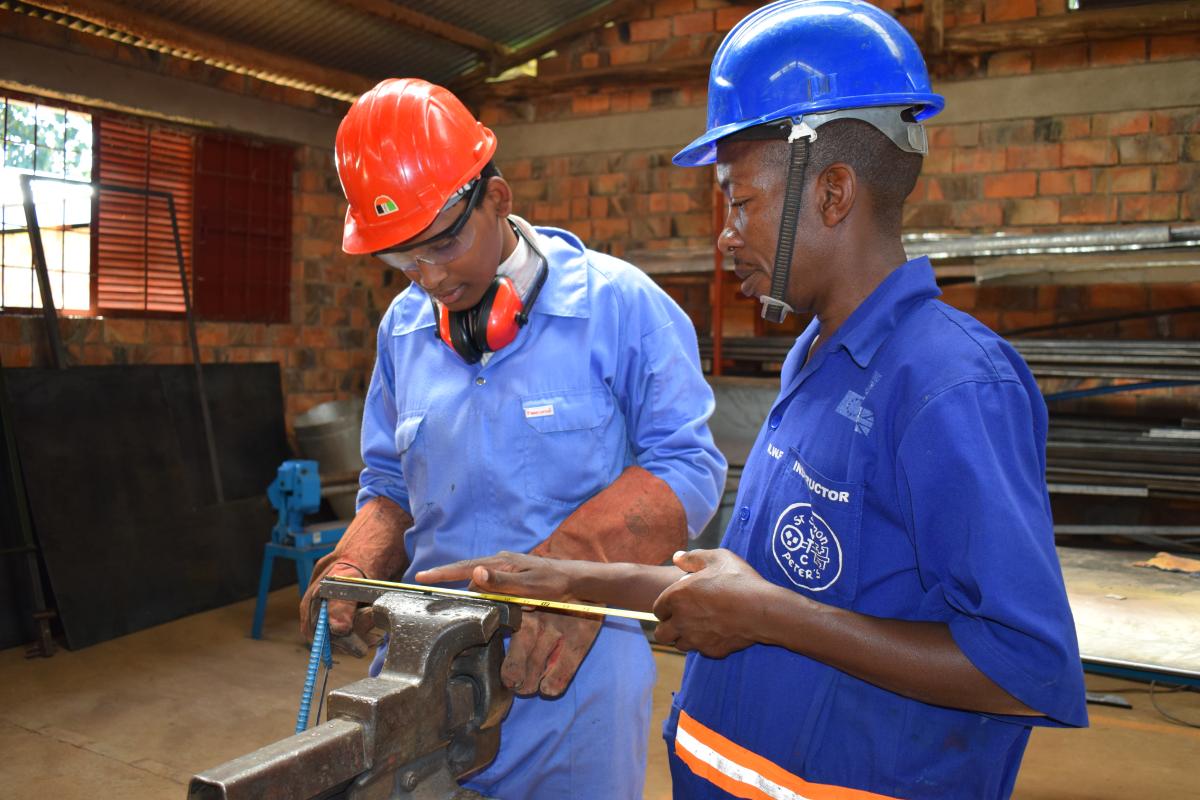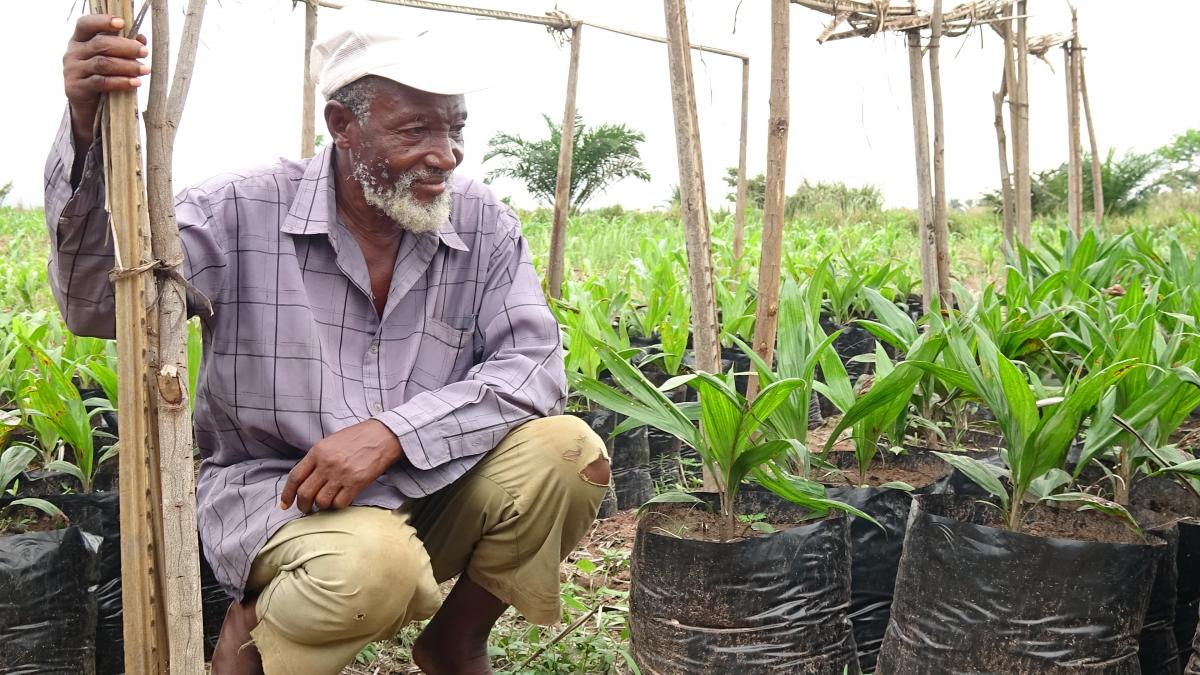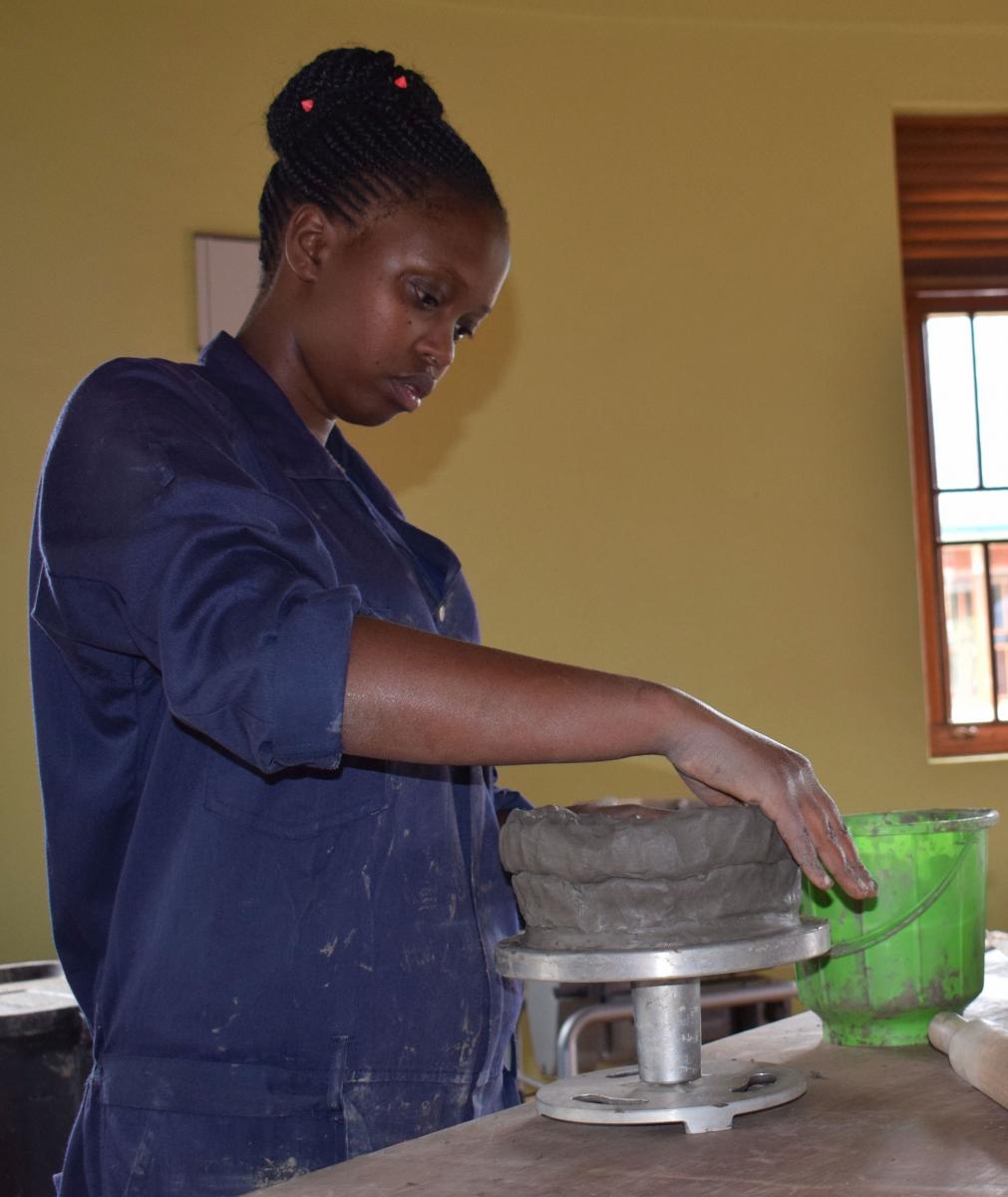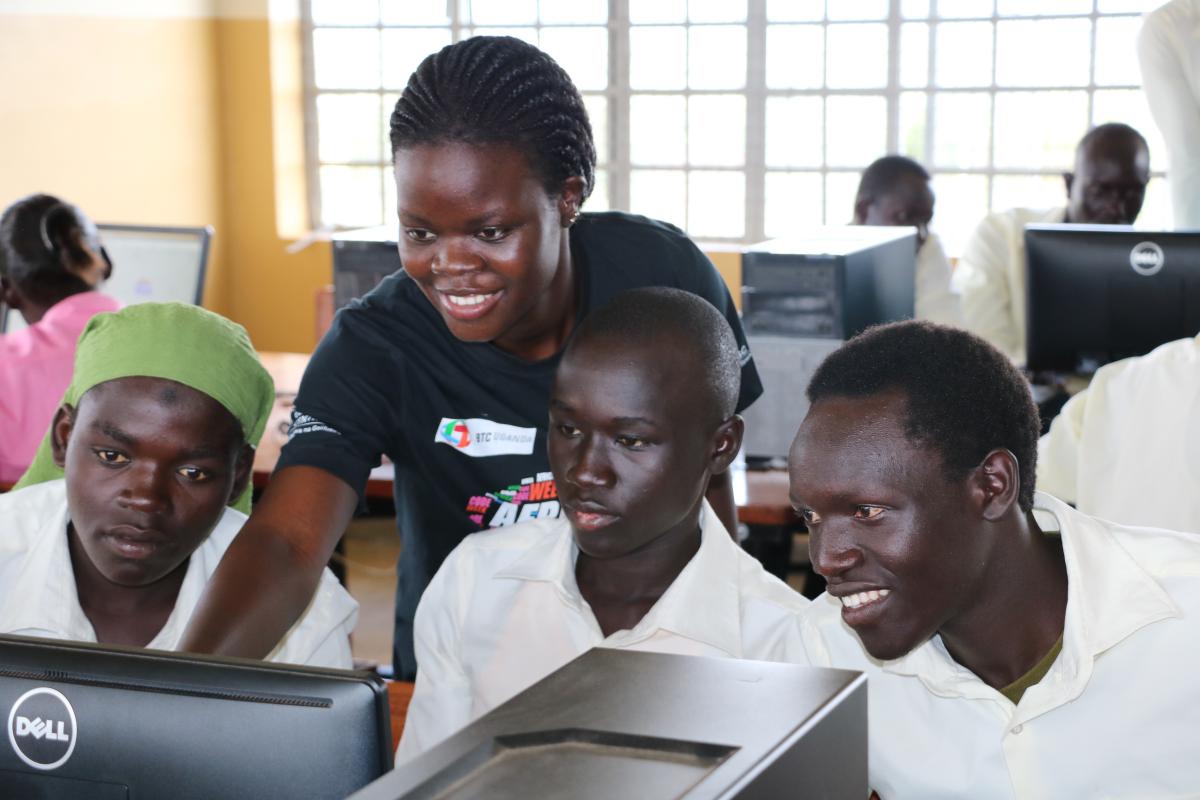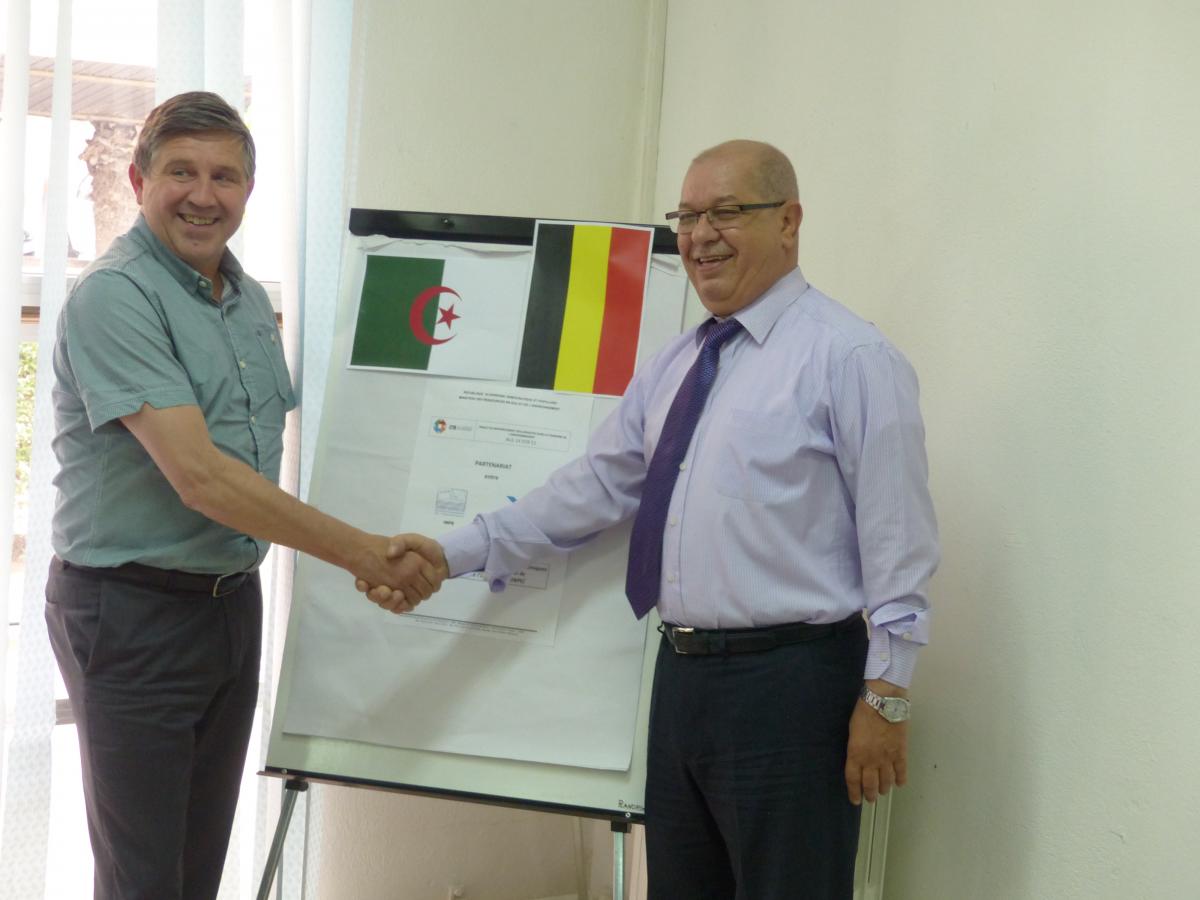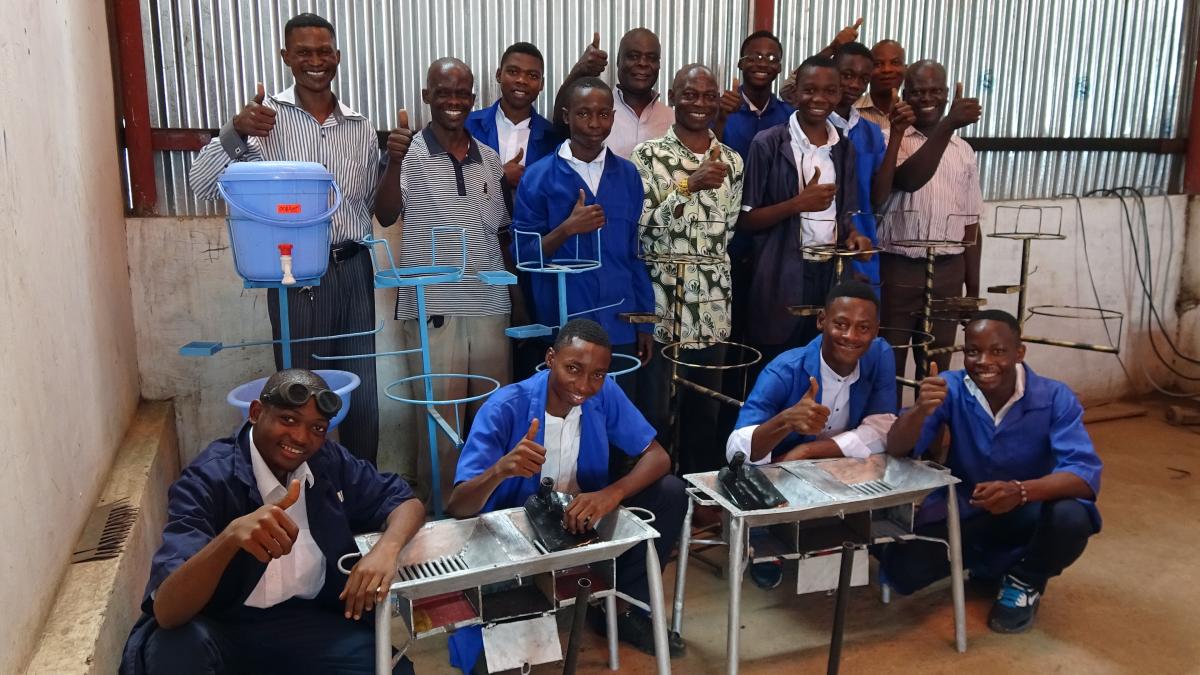Search
Viewing 2085 to 2100 of 2520 news
-
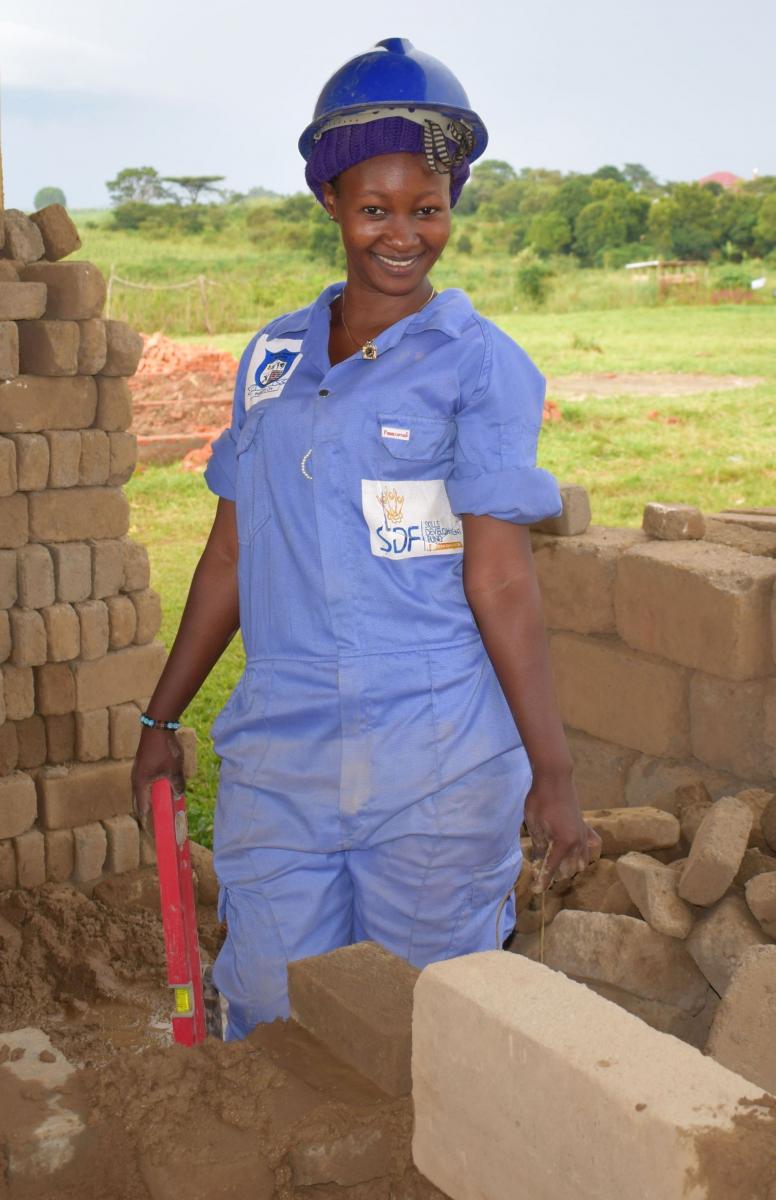
Skills Development Fund builds construction training
Hanna DEKERK | 21/11/2017
At 6pm trainees of the Building and Construction training at Buhimba Technical College in Hoima are still rehearsing their brick-laying skills. “We keep practicing because we all want to succeed our exam.”, says Claire Murungi, one of the 30 trainees subsidized by the Skills Development Fund (SDF) of BTC’s Support to Skilling Uganda project.Claire is the only girl in her community to pursue a career in construction. “I feel proud to take this class. I want to show that girls can also build.” Her fellow student, Michael Barongo, agrees that the collaboration between the 20 boys and 10 girls in the training is going well. “Girls are capable to do jobs that are done by men.”, he adds. Michael enrolled in the training after hearing about it on the local radio. “I admired builders. Especially after I worked as a porter at a construction site.” The SDF-subsidized Building and Construction training takes 6 months in total, including one month of industrial placement at a private company. Entrepreneurship classes are part of the program, and aim at motivating trainees to start their own businesses. Michael is already on board: “After the training I want to start a small company with my fellow students and employ people from my community.“ Classes are given by Daniel Esong, an engineer with 8 years of experience at multiple international construction companies. “My work here is to demonstrate building techniques and to assist students during practice. I also inform them on safety in the workplace and on HIV-awareness. I try to guide and council them.” He adds that the Skills development allowed the Buhimba College to provide safety gear for the trainees (such as overalls, helmet and gumboots) as well as working equipment (such as trowels and spirit levels). To upskill him with modern drawing techniques, he received an architectural design training on the ArchiCad modeling software.The Skills Development Fund in Albertine-Rwenzori aims at sustainably improving the quality of technical and vocational trainings through public-private partnerships, in order to enhance the youth’s employability.
-
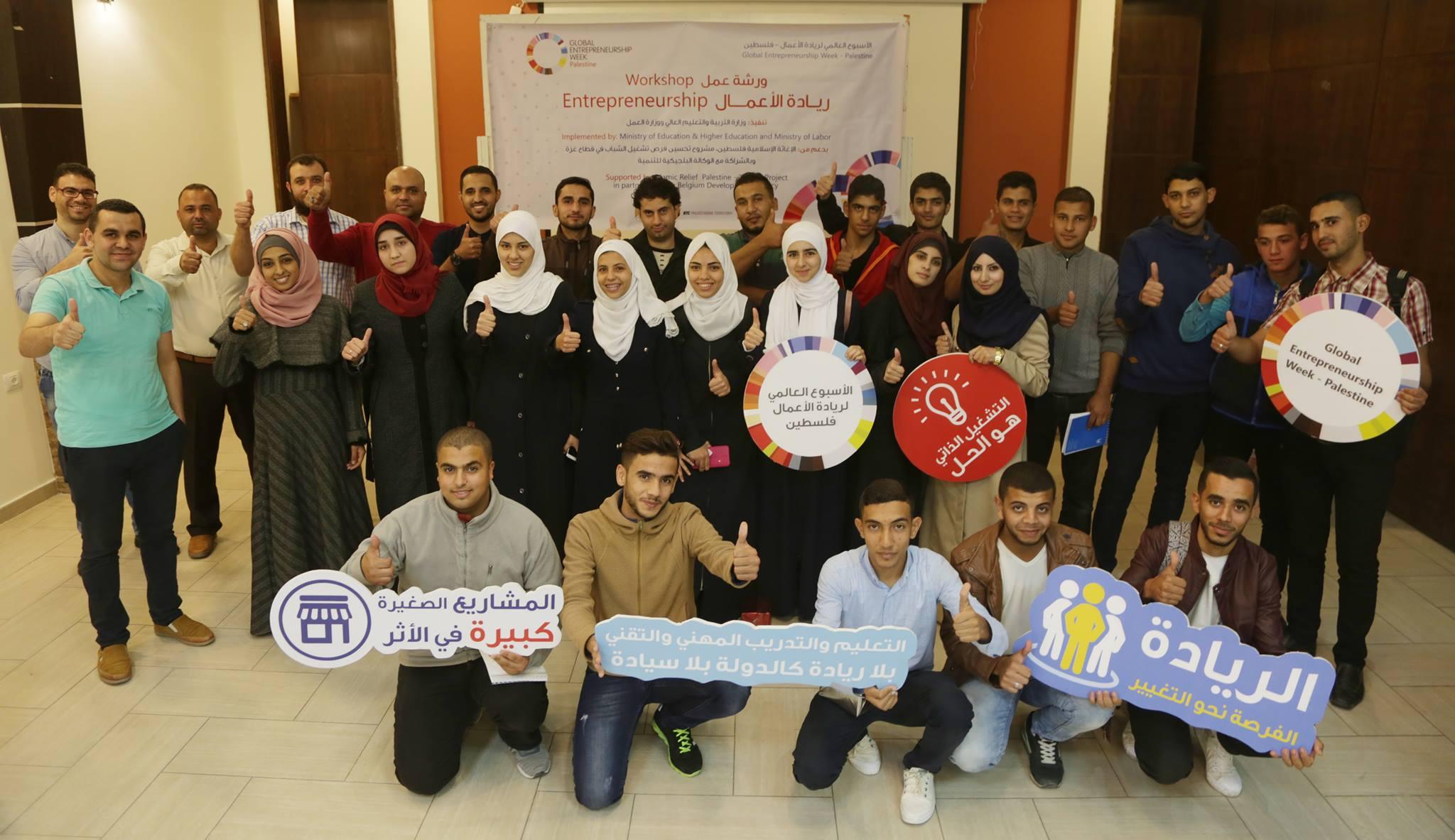
Global Entrepreneurship week in Palestine
Laura SCHILLEMANS | 20/11/2017
Islamic Relief Palestine and the Belgian Development Agency organized an advocacy event named “To be the change… Towards Entrepreneurship”, in coordination with the Ministry of Education and Higher Education (MoEHE) and the Ministry of Labor (MoL). The event aimed at providing a group of TVET students and graduates with the needed entrepreneurial competencies and to enable them to advocate to decision makers to integrate an entrepreneurial culture in the TVET system. The 2 day entrepreneurship workshop taught the students and graduates more about the concept of entrepreneurship and it made them aware about the importance of entrepreneurship in TVET, as a promising road to employment. The workshop resulted in 4 initiatives, focusing on four critical issues and proposals to integrate entrepreneurship in the TVET system, which were designed and presented by the 24 participants. The four initiatives will be used as advocacy initiatives towards the MoEHE and the MoL to ensure their commitment towards adopting an entrepreneurial culture in the TVET system.
-
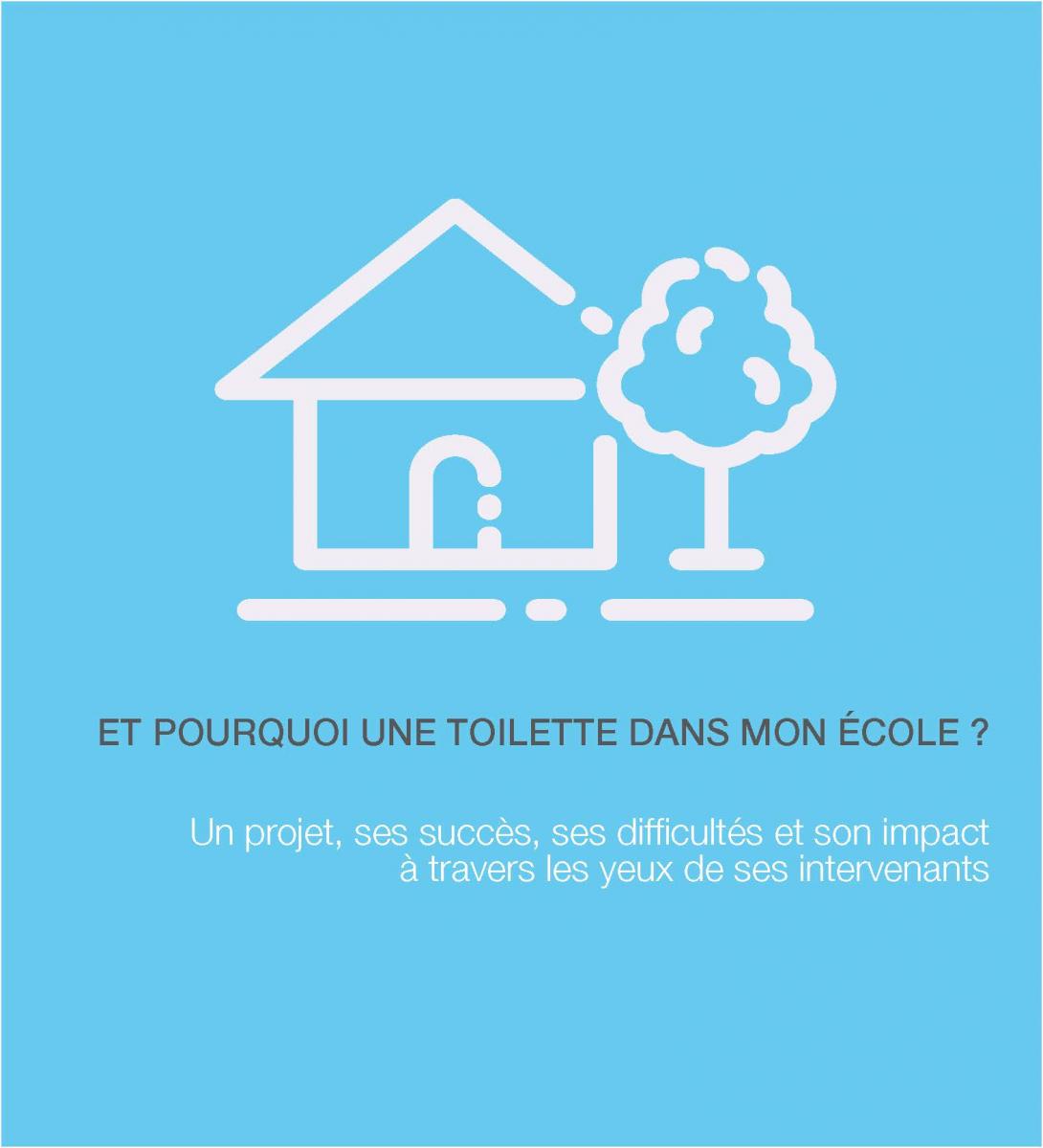
Et pourquoi une toilette dans mon école ?
Meriem HILALI | 20/11/2017
Au Maroc, la majorité des écoles rurales sont souvent sous-équipées et sont dépourvues notamment d’eau potable et de système d’assainissement. À peine 50% des écoles ont accès à des infrastructures sanitaires. En 2010, la coopération belge a fourni son appui au projet national de mise à niveau environnementale des écoles rurales en visant la réhabilitation de 250 écoles. Le projet visait l’amélioration des conditions de vie des élèves à travers la mise en place d’infrastructures sanitaires dans les écoles et la sensibilisation des enfants à l’importance de l’hygiène et de l’environnement. En améliorant durablement le cadre de vie des écoles et des villages, le projet visait aussi particulièrement à enrayer la déperdition scolaire des jeunes filles. Aujourd’hui, à la clôture de ce projet et après de nombreux défis, 190 écoles dans les régions de Taroudant, Taliouine, Zagora et Tinghir ont bénéficié de l’intervention et beaucoup de belles histoires se sont déroulées. Quelques-unes se retrouvent dans les pages suivantes... https://goo.gl/SYCDHX
-
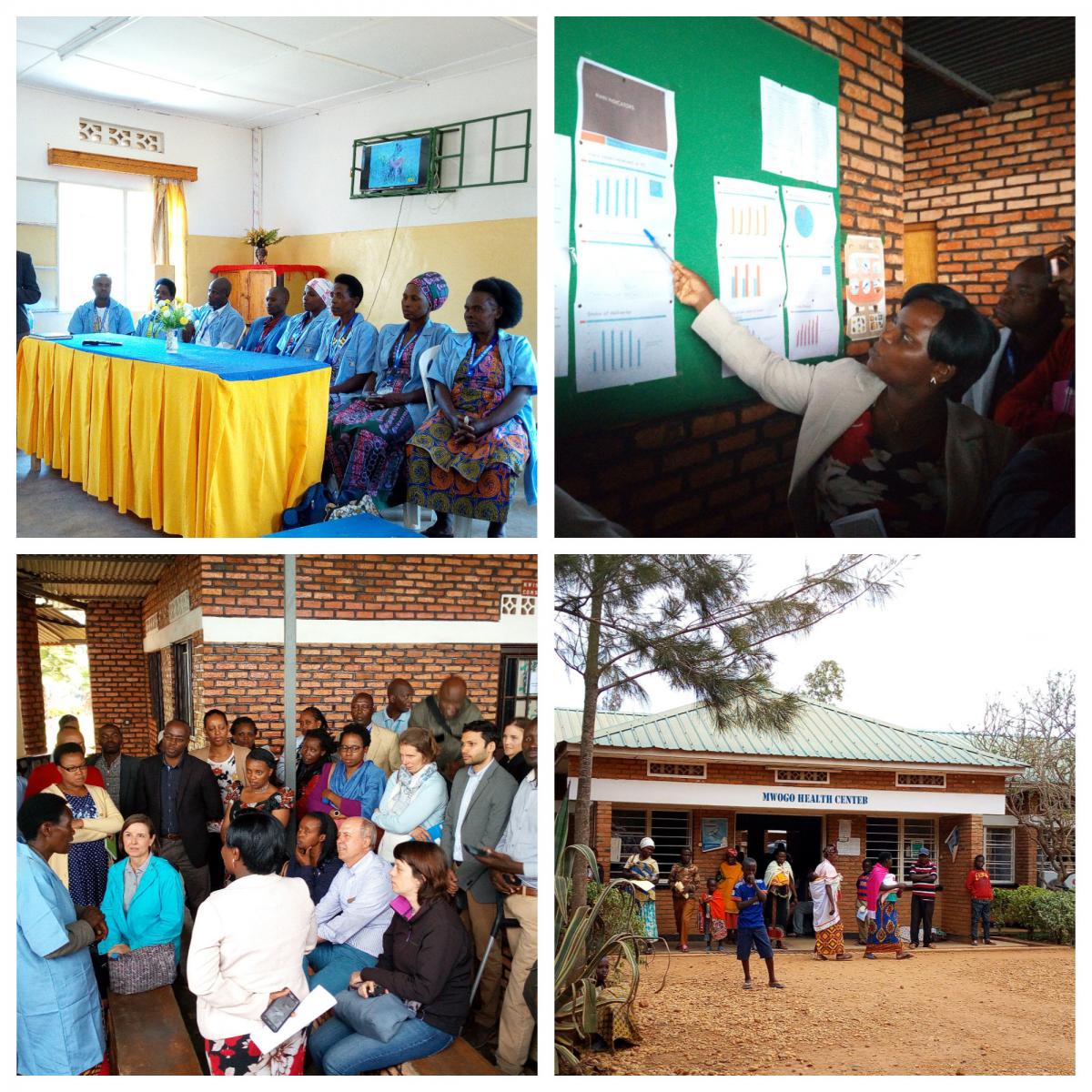
Health Sector Working Group Field Visits
Alexis DE HERDE | 20/11/2017
Between 24th and 26th October members of the Health Sector Working Group, including BTC and the Embassy of Belgium, conducted joint field visits to the Districts of Nyabihu, Gicumbi and Bugesera with a special focus on Family Planning, Nutrition and Hygiene.The visits were led by the Director General of Planning, Health Financing and Information Systems of the Ministry of Health. Bilateral and multilateral development partners as well as civil society organisations participated in high numbers. In each district, the local authorities presented the district health profile as well as achievements, challenges and good practices in the chosen topics and in other areas such as maternal health, malaria and community-based health insurance (mutuelles de santé). Discussions were followed by on-site visits to health facilities and Community Health Workers' cooperatives where participants were briefed on key services provided.Family planning and Youth Friendly Corners In the area of family planning for example, participants were briefed about the youth friendly corners set up in some health facilities where adolescents can receive counselling on sexual and reproductive health and family planning methods. The Demographic and Health Survey of 2014/15 found that 7% of girls between 15 – 19 years of age had begun childbearing (i.e. being pregnant or having given birth to a child) which was a slight increase from the 6% shown in the previous survey (2010). A number of cultural barriers with regard to access to services for the youth remain but the government is committed to addressing the issue and has been calling upon various stakeholders, starting from the household level, to take more responsibility for sensitising the youth in order to avoid unwanted pregnancies while scaling up access to services in facilities as well.Addressing malnutritionInterventions to address chronic malnutrition (also known as ‘stunting’ which is defined as low height-for-age) have been stepped up in some districts with the support of development partners. One particular case is the district of Nyabihu, which benefits from high agricultural productivity and supplies food to many parts of the country yet faces the highest rate of stunting affecting 59% of children under the age of 5 according to the 2014/15 Demographic and Health Survey (while the national average stood at 38%). Again, the government is addressing these challenges which among other things requires changing mindsets and promoting better and more diversified eating practices.Peer to Peer Learning Opportunities The field visits are highly valued by development partners as they provide an excellent opportunity to take stock of strides being made at different levels of the health system and to appreciate the commitments of the local authorities in delivering quality health care. The visits offer a space for peer-to-peer learning between stakeholders working at the policy level and health care providers on the ground and are seen as an important tool to inform and strengthen policy dialogue. Findings from the field visits are presented at the Joint Health Sector Review, which is a semi-annual forum chaired by the Permanent Secretary of the Ministry of Health .Health, a priority sector for Belgium Belgium has been a long-standing partner of the health sector in Rwanda. BTC currently supports a variety of interventions in close collaboration with the Government of Rwanda, namely through:i) sector budget support;ii) a capacity development pooled fund to strengthen human resources for health ;iii) the Ubuzima Burambye (‘Long healthy life’) institutional support programme which focuses on leadership and governance, quality of health care, urban health, mental health and maintenance of medical equipment and infrastructure.
-
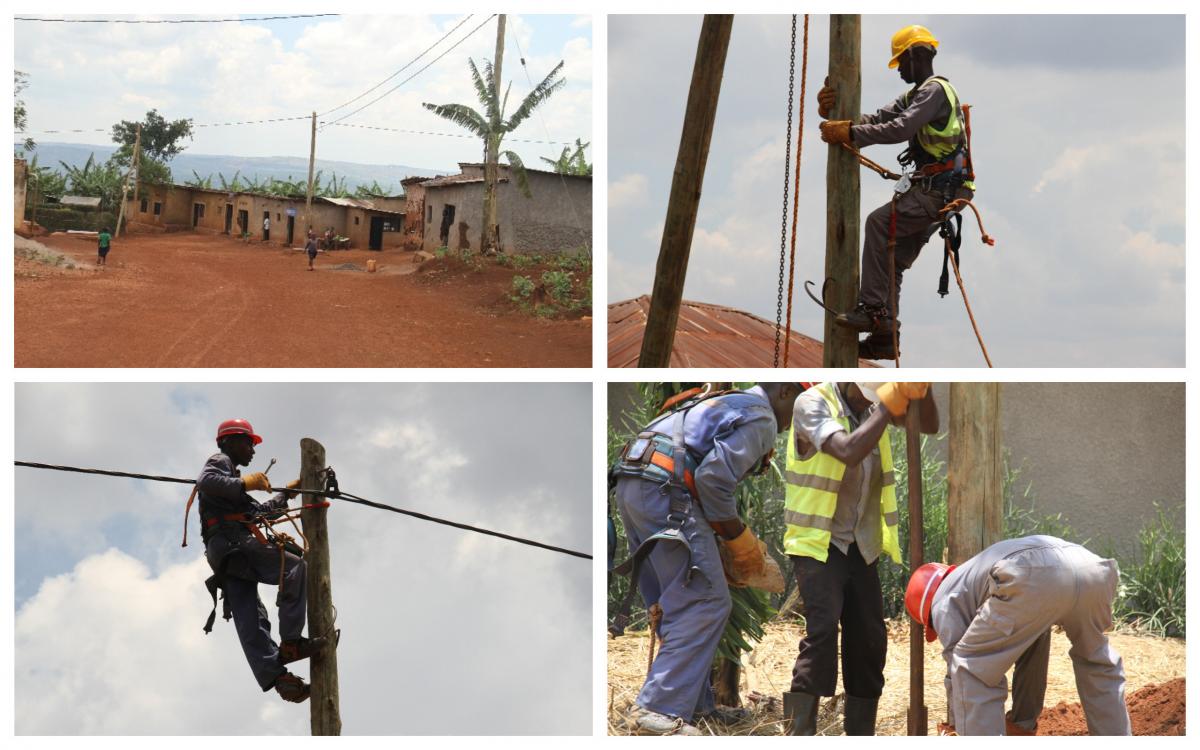
Electrification in Rwamagana
Alexis DE HERDE | 20/11/2017
“We have set our targets but we will have to stretch them in the future. Our general target is to connect all Rwandans by 2024” said recently the CEO of Rwanda Energy Group, Eng. Ron Weiss.Access to electricity in Rwanda is one of the key targeted development boosters of the Government. The current target, dubbed 7-5-2, stipulates a 100% access to electricity in Rwanda in 7 years while this percentage will be reached in Kigali City in only 2 years and in all productive use centres (health centres, schools, handcraft centres, markets, etc.) in 5 years.BTC is one of the main development partners supporting the Government of Rwanda to meet these targets. The support is channelled through the Electricity Access Rollout Program, EARP, a program based in EDCL, a Rwanda Energy Group subsidiary company in charge of Energy Development.Through 2 consecutive projects, namely BE-EARP1 and BE-EARP2, BTC is intending to provide access 20,340 households in the Eastern Province. Currently, 36.5% of households in the Eastern Province have access to electricity, including 24.5% connected to the national grid and 12% using off-grid solutions. Through a Tunisian contracting company - STEG - under the BE-EARP project, 8104 households are currently being connected to electricity. Stringing works and transformers installation are preceding the last step to connect house after house.Residents of Munyaga Sector, one of the 7 sectors to be electrified in Rwamagana District, welcomed this electrification project saying that it will enable them to start various businesses such as hairdressing, milling and welding.
-
Skills Development Fund uplifts welding training
Hanna DEKERK | 20/11/2017
With meticulous concentration students are welding doors and windows at the St-Simon Peter Vocational Training Centre in Hoima. Here, the Skills development Fund (SDF) of the Support to Skilling Uganda project subsidizes a 9-month basic welding and metal fabrication program for 18 trainees. 20-year old Grace Kemigisa is one of them. “This training teaches me the importance of practical skills.” After Grace’s father died, her mother was unable to pay her university fees. So when Grace learned through the local radio of the SDF-subsidized trainings at St-Simon Peter, she applied. “Before I was trying to study Business Administration to find a white-collar job. But this training has changed my attitude. With practical skills you can find work much faster.” 12 out of the 18 trainees are girls, which is remarkable as welding is generally a male-dominated profession. The SDF-trainings aim for gender equality by targeting at least 30% enrolment of girls. The 9 month-training will earn Grace a Worker’s Pass, provided by the Ugandan Directorate of Industrial Training. This certificate shall prove her skills countrywide. After graduation, Grace wants to work in the oil-and gas industry. She and her fellow students already gained practical experience during a two-month industrial training at the Bwendero Dairy farm, as part of their 9-month basic welding and metal fabrication training. This makes them more confident to take the tests for the companies that recruit for the oil-and gas industry. The SDF subsidizes an additional 6 trainees in Motor Vehicle body works, plus 6 more in motorcycle repair. According to Program Coordinator Muhumuza Emmanuel “The SDF has really benefited these trainings. It enabled us to buy a compressor to paint vehicles and provided trainees with personal protective wear. With the high demand for mechanics to repair motorcycles in the Hoima District, our graduates won’t stay unemployed after their training.” The Skills Development Fund in Albertine-Rwenzori aims at sustainably improving the quality of technical and vocational trainings through public-private partnerships, in order to enhance the youth’s employability.
-

Le Programme de Désenclavement au Kasaï-Oriental et au Lomami: fer de lance pour booster l’agriculture et la dynamisation du secteur
Julie CLAASSENS | 14/11/2017
Le PRODEKOR, dont l’objectif global consiste au désenclavement des bassins de production en vue d’une relance de l’agriculture et d’une sécurité alimentaire, a comme objectif spécifique la mise en place d’un réseau multimodal praticable en toutes saisons et entretenu par des structures locales. D’un budget global de 20 million d’euros, le programme intervient au niveau des infrastructures, mais aussi pour un renforcement institutionnel des services étatiques et une participation citoyenne dans les activités de développement avec une approche fondée sur la résilience. Les actions de renforcement institutionnel et d’appui structurel avec la démarche du ‘faire-faire’ par les services étatiques au niveau des provinces et des territoires, tenant compte de la décentralisation, pour l’accomplissement d’un contrat social entre l’état et la population par une approche fondée sur les droits, ont contribué à la fourniture d’un service de proximité de meilleure qualité avec un renforcement de la maîtrise d’ouvrage provinciale et une légitimité des pouvoirs publics.Les réalisations du PRODEKOR ont permis d’appuyer l’émergence et la consolidation de près de 80 entreprises privées comme des structures de réhabilitation et des PME de construction, …etc. En outre, les actions ont permis la professionnalisation de 7 Coordinations des Comités Locaux d’Entretien des Routes (COORDICLER), qui sont outillées pour participer aux travaux et pouvant permettre l’instauration d’un partenariat public-privé. Ainsi, cet appui a permis la création de près de 15 700 emplois, dont 5200 pour les travaux temporaires en HIMO et 10 500 pour les travaux réguliers d’entretien des pistes.Le programme compte à son actif la réhabilitation de près de 500 km de routes, l’aménagement de 9 ponts, l’entretien de près de 1 500 km, la construction de 21 dalots et de 10 buses ARMCO. Les travaux d’aménagement de près de 130 km de voie d’eau entre le port Ndomba et Lusambo (dont les travaux ont démarré durant le mois d’octobre), pour assurer la multi modalité du transport entre Kinshasa et les provinces du Kasaï-Oriental, de la Lomami et du Sankuru. Ces actions sont complétées par des interventions au niveau des bacs. Avec la construction/réhabilitation de 5 bacs, le PRODEKOR participe activement au désenclavement des populations des 3 Provinces. Concernant le thème Genre, le PRODEKOR a mis en œuvre des activités pour un renforcement du leadership féminin, ayant touchés près de 250 femmes par un renforcement de l’autonomisation des femmes, l’alphabétisation fonctionnelle, des appuis aux initiatives féminines face aux violences sexuelles et le renforcement de la sororité. Les activités dans le domaine de l’Environnement, avec des appuis aux communautés pour une résilience face aux changements climatiques ont permis la formation de 72 pépiniéristes, l’aménagement de 30 sites de reboisement et la transplantation de près de 130 hectares.
-
Le Kasaï Oriental et le Lomami, deux provinces productrices d’huile de palme demain?
Julie CLAASSENS | 14/11/2017
Les perspectives s'annoncent bonnes, depuis que l'Agence Belge de Développement, CTB RD Congo, à travers le programme d'appui au développement agricole du Kasaï Oriental, PRODAKOR, s'est impliqué dans la promotion de la culture du palmier à huile.En effet, le palmier à huile est l'une des cultures retenues comme prioritaire par les populations de cette partie de la République Démocratique du Congo. C'est ainsi qu'avec le début des activités du programme, l'appui à la filière palmier à huile a démarré, avec l'objectif d'atteindre près de 3000 hectares au bout de 5 années de travail.Dès 2014, une série de commandes des graines pré germées de palmier à huile Tenera, de variété Cirad, a été faite, après une procédure de passation des marchés publics, auprès de l'entreprise PALMELIT installée au Bénin. De ces graines, plusieurs petites pépinières ont été installées dans les villages, afin de produire des plants sains qui devaient être achetés par les petits exploitants agricoles intéressés, afin de leur permettre de réaliser leurs petites plantations.C'est ainsi qu’entre 2014 et 2017, 270 000 graines ont été commandées. Les plants issus des pépinières réalisées en 2014 et 2015 ont permis de réaliser près de 961 hectares, dont 491 hectares dans le Kasaï Oriental et 470 hectares dans le Lomami. Il s'agit des milliers des petites plantations individuelles réalisées par 2662 planteurs avec près de 137 405 plants de palmier à huile. En cette année 2017, il y a 448 pépinières villageoises qui ont été installées et qui contiennent actuellement 129 962 plants en plein développement. Ces plants pourront servir à emblaver environ 908 hectares, avec une moyenne de 143 plants par hectare.Les premiers palmiers améliorés plantés commenceront à entrer en grande production en 2020, avec une phase de démarrage à partir de 2018. Cette entrée en production aidera les petits agriculteurs à améliorer leurs revenus, issus des activités agricoles, dans le respect des normes environnementales, car le palmier à huile pourra produire pendant que les cultures vivrières seront encore en végétation et donc pendant la période où les agriculteurs n'ont généralement pas assez de revenus.Un calcul rapide a été fait sur base des informations sur la production fournies par PALMELIT et obtenues également du marché local sur le prix de vente de l'huile de palme. Il apparaît que pour un agriculteur qui possède une petite plantation de 10 palmiers, il peut améliorer son revenu de 11 USD par mois, issu de la vente de 23 litres d'huile produite par ces 10 palmiers.Une enquête réalisée en 2014 sur les revenus des agriculteurs de cette contrée a montré que le revenu de 63 % des agriculteurs ne dépassait pas 50 USD par mois. Pour cette catégorie d'agriculteurs, ajouter à leurs revenus environ 11 USD chaque mois n'est pas négligeable. Si l'agriculteur a une plantation d'un hectare, alors son revenu peut augmenter de 165 USD chaque mois.Le défi qui reste à affronter dans cette activité est celui de continuer à fournir des plants sains aux agriculteurs à partir de l'INERA Yangambi, car même les palmiers CIRAD sont produits à partir de souches venues de Yangambi. Nous espérons que cette station sera en mesure de fournir les quantités qui seront demandées par les planteurs.Le futur s’annonce donc prometteur pour que les provinces du Kasaï Oriental et du Lomami soient comptées demain, comme des provinces productrices d'huile de palme, car ce palmier Tenera, de la variété CIRAD peut produire pendant 22 ans. L'environnement naturel de ces deux provinces s'y prête, avec des vastes savanes inexploitées, dans lesquelles le palmier à huile est souvent le principal arbre de manière spontanée.
-
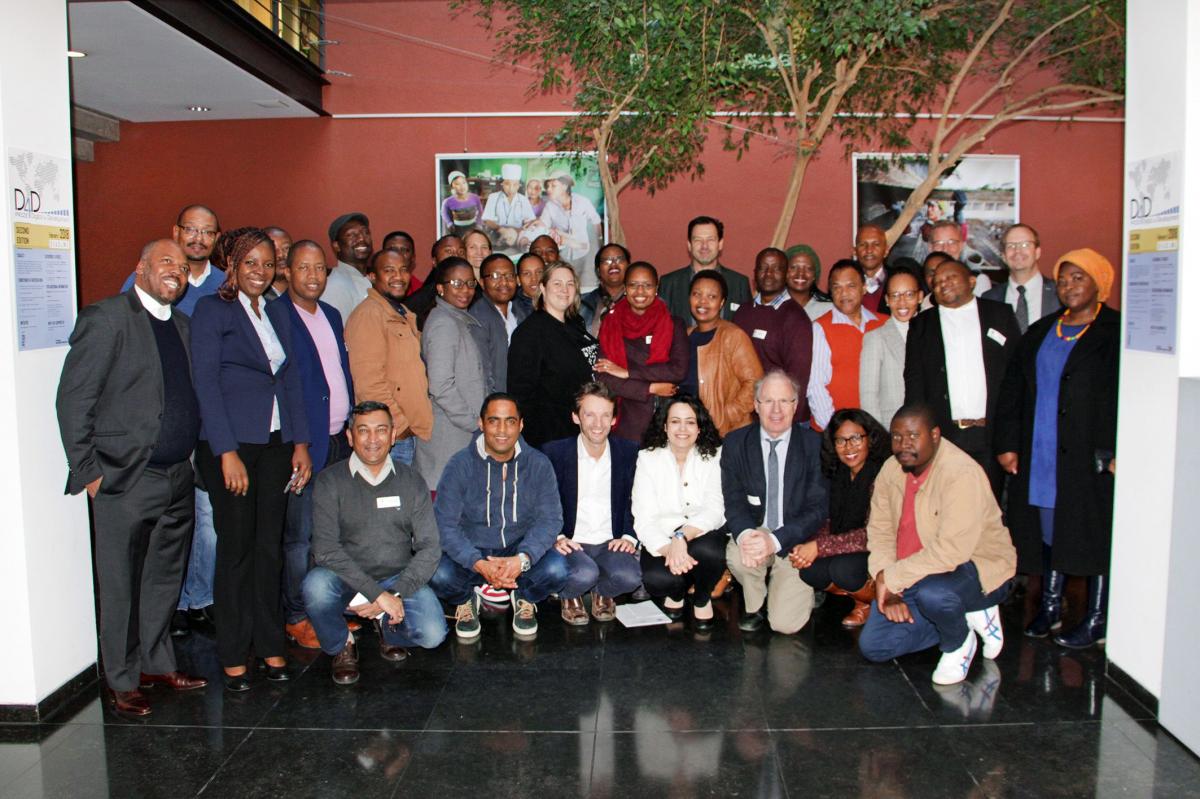
Exchange between South African Ministry of Finance and Universities on Public Financing Management (PFM)
Princia BAZABIDILA-MONASSALA | 13/11/2017
On Friday 20 October 2017, thirty Directors of South Africa’s Ministry of Finance, mostly from the National Treasury, visited BTC on the last day of their training session on Public Financing Management for a review of the training session. This Brussels study tour from 7 to 22 October 2017 was financed by the Studies Fund. It included a one-day visit (13 October) to the OECD in Paris. The study tour was organised by BTC in collaboration with the VUB and the University of Antwerp. It concerns a professional continued training exchange programme in Belgium and South Africa for civil servants of the National Treasury, of sector departments and of municipalities. For two weeks, the participants worked intensively with Professor Jacques Vanneste , who teaches Economics at the University of Antwerp, and with Professor Claeys , who teaches at the VUB in Brussels. The participants were satisfied with the training content and the exchanges. They will attend a second training session in Pretoria from 20 to 24 November 2017, which will eventually lead to certification.
-
Skills Development Fund empowers women through bead-making
Hanna DEKERK | 13/11/2017
The Amaani Rwenzori youth development center in Fort Portal offers a second chance to school drop-outs or to those were unable to pay school fees. Here, 19 vulnerable women and girls follow pottery classes thanks to the Skills Development Fund (SDF) of BTC’s Support to Skilling Uganda project. 24-year old Judith Kirungi is supporting the bead-making classes. “I learned how to make bowls, plates and vases. But my favorite is making beads. I am now becoming a specialist.” Close to completing a one-year pottery course, Judith was asked to pass her skills on to future trainees. “I like teaching because the trainees listen well. Sometimes there is a language barrier as some English words don’t translate well in the local language. But we try to make it work.” At Amaani Rwenzori, the SDF finances a pilot training which teaches women clay bead-making from their homes. These women cannot leave their houses for long periods of time for various reasons: from working in the field to caring for sick parents or small children. As soon as the women complete the training, they receive all necessary materials to make raw clay beads from their homes. Amaani Rwenzori then collects the beads for baking and glazing, and markets them. The women share in the profits if the beads are of good quality. If successful, the pilot will extend to other pottery products. Through a cost-sharing mechanism, the Skills Development Fund additionally pays 100% of the center’s life skills trainings and 27% of vocational trainings for 50 out of 65 trainees. Hamilton Kalyegira, a life skills trainer at Amaani Rwenzori, values the program “It helps to develop the student’s personality.” Courses include exercises on critical thinking, problem-solving and social interaction. “Some students would stare at the floor and talk quietly. Now they are speaking out well.” During the life skills courses trainees also focus on family planning, healthy nutrition and first aid. According to Benjamin Kennedy, the Director of Amaani Rwenzori “What makes the SDF-scheme unique is the collaboration with the Uganda Small Scale Industries Association (USSIA), our co-applicant for the Fund. It allows us to partner with industry experts from 12 different sectors.” The Skills Development Fund in Albertine-Rwenzori aims at sustainably improving the quality of technical and vocational trainings through public-private partnerships, in order to enhance the youth’s employability.
-
Digitalization for Development: computer skills for refugees
Josephine OMUNYIDDE | 13/11/2017
The excitement on the faces of students at the animated motions and sound coming out of the computers is astounding. This happens to be a first-time experience for students of Lokopio Hills Vocational Training Institute (VTI) in Bidi-bidi refugee settlement in Uganda to learn coding using an easy to use software, thanks to the support from the European Union Trust Fund (EUTF). “My first time to use computer was when I joined institute a few months ago, today am able to code using blocks and create motions of a cartoon with sound. It is this simple.” Says 20-year-old Apio Immaculate. Immaculate is one of the 90 refugee and host community youth that are undergoing the coding training at Lokopio VTI. This year’s Africa Code Week focuses on how to use ‘scratch’, a visual programming language developed by the MIT (Massachusetts Institute of Technology) Media Lab to lower the technical threshold for coding. Coding is widely considered as the “blue collar” job of the 21st century and is introduced to trainees in order to equip them with skills that can support them in today’s world. In Uganda, ACW 2017 partnered with a number of partner such as Makerere University as well as with Belgian Development Agency (BTC)’s Support to Skilling Uganda project with an aim to empower future generations with the coding tools and skills needed to thrive in the 21st-century workforce and become key actors in Africa's economic development. 22-year-old Matovu Joseph who awaits his graduation in Electrical Engineering, a lead trainer at Lokopio shares his experience “this is my first coding class. It is an opportunity for me to transfer knowledge to such a vulnerable group of refugees. The students have appreciated the simplicity in using scratch for coding as a programming language; it is like computerized way of building blocks”. While taking place in Lokopio VTI with support from the European Union Trust Fund, the ACW was concurrently hosted in Buhimba VTI in Hoima district, St Daniels Comboni and Nakapiripirit VTI in Karamoja region, St Joseph Virika in Kabarole district and Kasese Youth Polytechnic in Rwenzori region with 450 beneficiaries from the respective Business Technical Vocational Education Training (BTVET). ACW in Uganda is part of 35 African countries that are hosting over 1,500 coding workshops involving 500,000 children and youth across the continent. The trainers of coding in Lokopio are part of the youth that were trained at Makerere University (MUK) in partnership with BTC, MUK College of Engineering, Design, Art & Technology (CEDAT), College of Computing and Information Sciences (CoCIS), Resilient Africa Network (RAN), Hive Colab and Women In Technology Uganda (WITU) to extend Africa Code Week (ACW) to BTC’s SSU project. 23-year-old Edith Ndagire, a third year Telecom Engineering student, who was trained as a trainer and was part of the instructor team at Lokopio says “the students here are enjoying the coding lessons and have grasped faster than I expected. They are disciplined”. “As a refugee student of Agriculture at Lokopio VTI, I plan to use coding knowledge in creating awareness cartoons focusing on stopping environmental degradation in agriculture for the community” says Immaculate who comes from a refugee family of 8. The ACW initiative empowers refugee youth such as Immaculate with skills on how to use the computer software and this put them in a good position of not only passing the knowledge to their trainees but also to create income generation for themselves. BTC’s participation in ACW targets VTIs, refugees and host community populations that are often neglected when innovative interventions such as digitalization are rolled out.
-
7 novembre 2017 : Séminaire sur les domaines de collaboration entre acteurs de l’eau et de l’environnement. Ksar El Boukhari
Cherif AOUDJIT | 09/11/2017
Ce séminaire qui a réuni plus de 100 personnes, est la première activité du nouveau partenariat entre la Société wallonne des eaux (SWDE) et l’Institut National de Perfectionnement de l’Equipement (INPE). Ce projet de coopération, d’une durée de 13 mois, vise à renforcer l’efficacité de la formation dispensée par l’INPE dans le sens d’une gestion intégrée et durable des ressources en eau. Il permettra notamment de former 23 personnes à l’intégration de l’environnement dans la gestion de l’eau. Le projet de partenariat associe également les compétences de la Société Publique de Gestion de l'Eau (SPGE) et le groupe COMASE. La SWDE intervient également dans le projet de partenariat avec le Centre de formation aux métiers de l’eau. Ce projet, d’une durée de 20 mois, vise à accompagner ce nouveau centre dans la construction de son offre pédagogique et notamment à l’aider à se doter d’une organisation fonctionnelle et de capacités pédagogiques adéquates. Il prévoit notamment de former 46 personnes dont 12 formateurs. Le CNFME, inauguré en 2016, a été construit avec l’appui de la CTB.
-
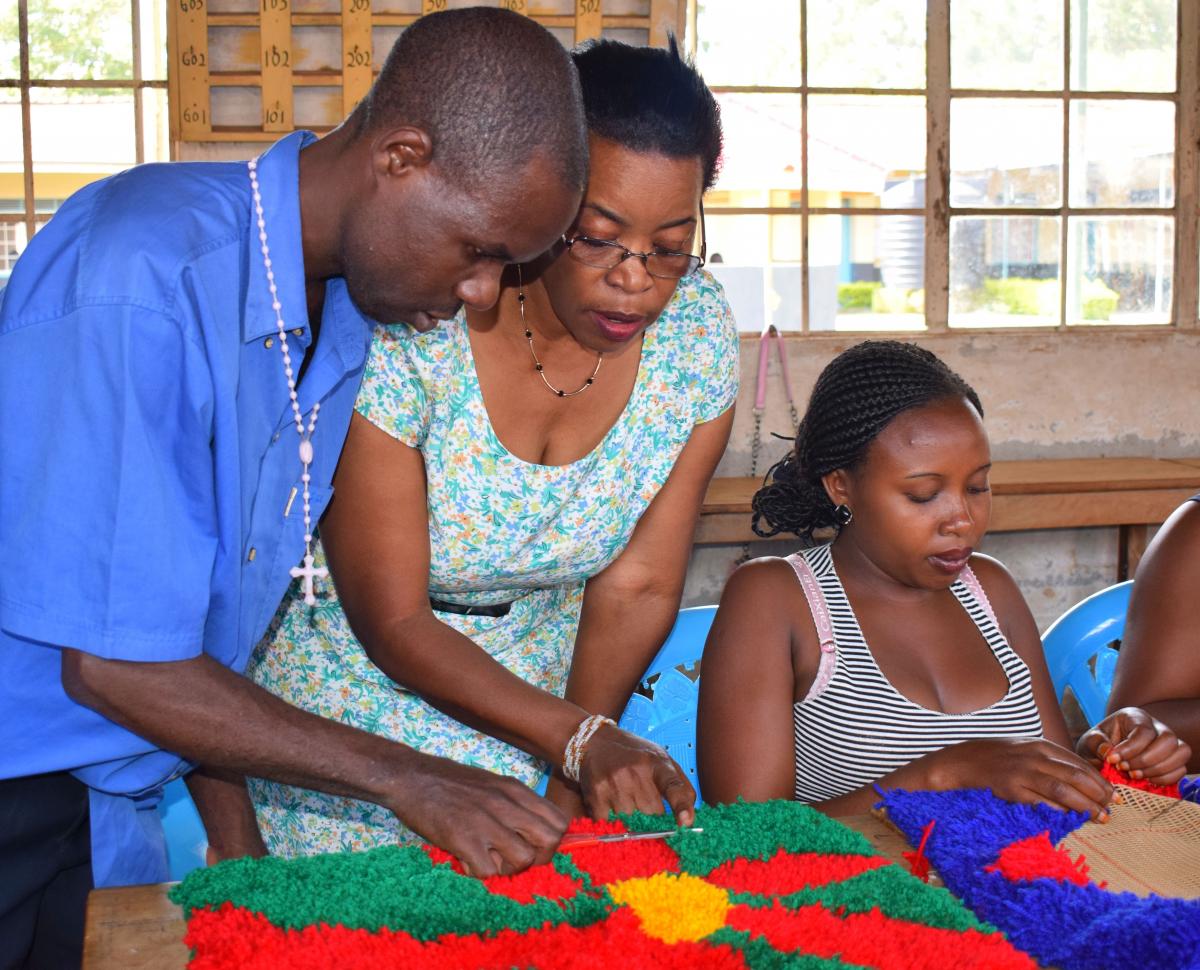
Next-level tailoring thanks to the Skills Development Fund
Hanna DEKERK | 09/11/2017
Amid colorful balls of yarn, trainees put the finishing touches on scarves, ponchos and doormats. They have been working on these items for weeks as it counts for their final examination of the 'Knitting and Crochet' training in the Rosa Mystica Institute in Fort Portal. “Every tailor in town knows how to make a dress or shirt, but not everyone knows how to make a doormat," says their proud trainer, Eunice Wekesa. Passionate about sewing, Eunice has been working as a textile trainer for over ten years. “It has taught me patience. Some of my students don’t have high academic levels but because they are patient with their work they do it even better.” Her students are the fifteen trainees in 'Knitting and Crochet' and sixteen trainees in 'Tye and Dye', facilitated by the Skills Development Fund of BTC’s Support to Skilling Uganda project. The majority of them being vulnerable youth and school drop-outs, they were selected for the training through local church councils and leaders. Sister Florence Ahaisibwe is the Director of the Rosa Mystica Training Institute of Vocational and Business Studies. “Before the curriculum was aimed at making uniforms and common clothes. Now we switched to tourism wear and handicrafts, to also attract the tourists in Fort Portal.” They started doing so after the Uganda Small Scale Industry Association (USSIA) gave them the advice. Moreover, through the Skills Development Fund, USSIA organized training sessions with three Kenyan knitting and crochet experts.“Thanks to BTC’s intervention I could expose my trainees to different techniques.” says trainer Eunice. “We now also have embroidery machines, which allows for next-level stitching and finishing." For a long time, the institute was only accessible to girls and women. But as trainings are gender-equal, boys were welcomed. John Koojo is one of those boys. “Before I was an artist, designing badges, banners and posters. Thanks to this training I was able to polish my knowledge and get new ideas.” The entrepreneurship courses also gave him insights in financial management and business plans. “I am now motivated to start my own shop with creative designs.” The Skills Development Fund in Albertine-Rwenzori aims at improving the quality of technical and vocational training through public-private partnerships, in order to enhance the youth’s employability.
-

L'or rouge à l'honneur au Maroc
Roxane VANLERBERGE | 08/11/2017
Le safran est une source importante de revenus pour près de 3.000 familles. Il représente une activité économique pour la petite agriculture solidaire. Notre collègue Olivier LEGROS nous explique les activités menées par le projet tout au long de la filière safran lors du Festival international du safran à Talaouine (Sud du Maroc) qui a eu lieu du 3 au 5 novembre 2017.
-
Vers la formation en alternance en 2017-2018!
Julie CLAASSENS | 08/11/2017
Dans le cadre de l’amélioration de la qualité de la formation des jeunes dans le Kasaï oriental, le programme d’appui à l’éducation fait avancer le processus de la formation en alternance par le choix des entreprises devant accueillir les apprenants pour leur encadrement.Cette approche, toute nouvelle pour le secteur de l’Enseignement Technique et la Formation Professionnelle au Kasaï Oriental, organise le cursus scolaire secondaire technique en deux temps à savoir : une période des cours théoriques à l’école et une autre partie faites des cours pratiques. Cette dernière partie s’organise dans trois espaces d’apprentissage dont l’atelier, l’activité génératrice de revenus et l’entreprise. En effet, une dizaine d’entreprises de la place ont donné leur accord et disponibilité pour l’accueil des apprenants dans le cadre de ce projet pilote de formation en alternance. Pour y parvenir, les écoles, le programme éducation au Kasaï Oriental et les entreprises envisagent signer des conventions de faisabilité. « Ces initiatives permettront aux élèves de savoir exactement ce que nos équipes font à longueur des journées et c’est pour leur bien dans le futur après les études » confie un responsable d’une entreprise retenu pour l’alternance. L’équipe EDUKOR a ainsi organisé en octobre dernier une mission de vulgarisation du contenu de cette convention, mission dont a résulté l’approbation du projet pas les entreprises.La formation en alternance est programmée pour l’année scolaire 2017-2018 au Kasaï Oriental et à la Lomami. Elle concernera en premier les cinq centres d’application retenus pour la ville de Mbuji-Mayi et la cité de Ngandajika. « Cette nouvelle approche m’inspire confiance et me redonne l’espoir sur l’avenir des enfants dans nos écoles techniques et professionnelles quant au couronnement de leur formation et les possibilités d’obtention de l’emploi », déclare un chef d’établissement dont l’école est retenu comme centre d’application. Ce projet se met en œuvre pour les filières porteuses d’emploi à savoir la mécanique générale, l’agriculture générale et vétérinaire, l’agriculture et la transformation alimentaire, la mécanique moto puis la menuiserie. Les différents outils de cette approche sont déjà créés et les chefs d’établissements sont bien engagés à la mise en œuvre.
